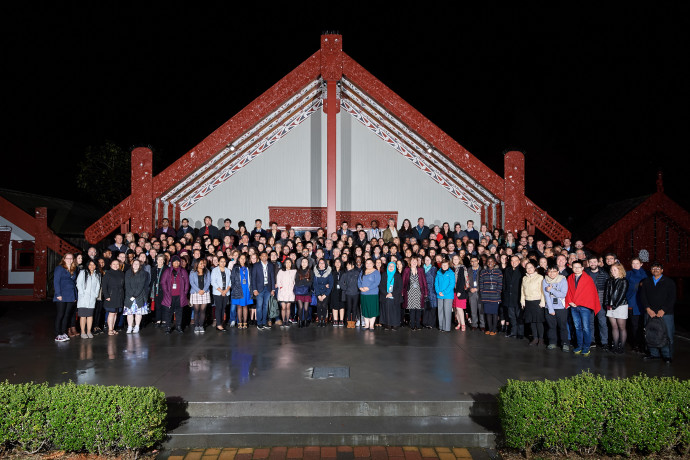PhD drought in food science

In this section for submissions from our Fellows, Distinguished Professor Harjinder Singh FRSNZ and Dr Kevin Marshall discuss the crucial role that PhD students play in progressing food science research in Aotearoa. However, this is a discipline typically populated by a large quantity of highly skilled international students, which is no longer possible because of COVID-19. Therefore, there is an apparent gap that now needs to be filled.
There’s more to our food industry human resource problems than finding fruit pickers and packers. The Riddet Institute, our national food science research engine, draws on some of the best talent from overseas, as well as the top New Zealand graduates, for its pool of over 100 PhD students. These fine young people come from all over the globe, with the deep knowledge of their own food culture, markets and tastes that our exporters need. They bring with them a hunger for higher tertiary education and advanced learning. More than 80% of the Institute’s student cohort comes from overseas and about two-thirds end up staying in New Zealand and make a long-term contribution to our food industry. Those that return home take with them great goodwill for New Zealand and an appreciation of our high standards of research and production. They stay connected with friends and associates back here, thus forming an influential global network for New Zealand.
Because of COVID-19, the number of PhD students that can come into the country in early 2021 was capped at 250 across the whole New Zealand tertiary sector, with Minister Hipkins recently announcing that a further 1000 already enrolled students may re-enter the country. But all of these will be returnees who were trapped outside New Zealand when the pandemic hit, not the new ones needed to fill positions at higher education institutions up and down the country.
Wouldn’t it be wonderful if we could get New Zealand students to take up these PhD opportunities, people ask at first glance at the problem? Our experience shows that it is highly unlikely that we could ever get the number required. Many who go into the food industry prefer to start earning as industry or company graduates. A tiny proportion of our small population (or any population) are attracted to, or cut out for, the kind of in-depth study a PhD involves.
The universities and research institutions including ourselves, continue to make earnest efforts to recruit New Zealanders, especially Māori and Pasifika, but we need a bigger pipeline of high performing scientists to fill the variety of jobs that would be available to them within the food sector.
The Riddet Institute has a wide research portfolio, from contributing at the highest levels to United Nations Food Agricultural Organisation (FAO) studies on the comparative protein quality of foods, and food security planning for 9-10 billion people, to the minute particulars of how the microorganisms in the bowel affect your digestion and appetite. Our scientists are highly respected internationally. Food science is not all about tweaking food additives and concocting new recipes for muesli bars; it is about getting a solid understanding of food chemistry and physics, the food’s nutritional qualities and how it impacts on human health.
As well as the urgent economic need to increase our food exports and fill the hole left by tourists, while at the same time reducing environmental impacts, there is a crisis of malnutrition, obesity and general health to be addressed. It’s not as simple as measuring what goes in your mouth, minus calorie expenditure. People don’t generally realise that how and where you break down food in your digestive tract makes all the difference. Riddet Institute scientists are studying the importance of food structure and “bioavailability”. Just because you eat protein, doesn’t mean your body can digest and absorb it. Older people, particularly, don’t eat enough protein, and become frail all too soon. Food scientists are really focussing on how to keep our growing older population stronger and more independent for longer.
There are some major studies recently completed and underway at the Institute, with personal health and national economic implications. Institute scientists Professor Jim Mann CNZM FRSNZ, Dr Lisa Te Morenga, and Evie Mete (soon to be Dr Evie Mete) had a paper published recently in the prestigious UK Lancet medical journal, showing the fundamental and much greater difference than previously thought, between eating natural and processed grains. Another study comparing the health status (physical and psychological) of people eating pasture-raised red meat and alternatives may result in an even higher premium for New Zealand beef and lamb. The PhD students all pursue very focussed research programmes, such as how breast and/or bottle feeding babies establishes their all-important gut microbiome.
The Riddet Institute has now been re-funded for another 8 years and has a new research strategy addressing both global and local food issues. We have to help our producers adapt to and apply all the transformational technologies needed to make value-added products and extend the shelf life of foods at ambient temperatures for consumers in developing countries. The other main area of investigation is sustainable proteins, where scientists are experimenting with a range of plant and/or animal combinations, and food structure and nutrition - the backbone of Riddet Institute research.
Our food industry is about so much more than efficiently producing safe, healthy food and getting it to market on time, in good nick. It needs high precision science at every turn. We need the best brains, whether they are nurtured here or overseas.
Distinguished Professor Harjinder Singh FRSNZ, Director and Dr Kevin Marshall, Board Chair; Riddet Institute, a national centre of research excellence (CoRE), hosted by Massey University
